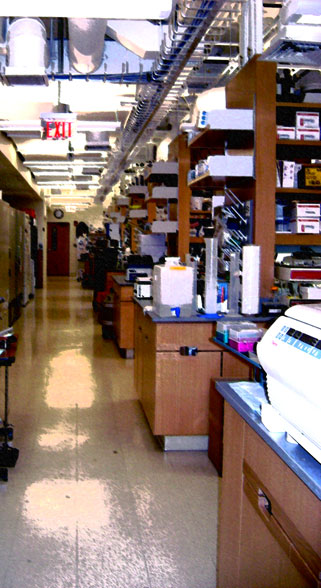Welcome to Graduate Studies
A Message from Christopher D. Andry, PhD
Chairman of the Department of Pathology & Laboratory Medicine
Welcome to our department!
Current foci of research by departmental faculty and students include:
- disorders of brain development and normal aging
- disorders of cell cycle and cell signaling in the pathogenesis and progression of colorectal, breast and hematopoietic cancers
- normal and abnormal immunological responses to infectious agents and environmental toxins and to other stimuli that may be responsible for amyloidosis or autoimmune disease, disorders of control of energy metabolism related to pathogenesis of diabetes mellitus and obesity
- development of immunotherapies for cancer and infectious diseases
Graduate training opportunities offered by our department include a doctoral program for PhD and MD/PhD students and a Master of Arts program.
Prospective applicants to the PhD program in Pathology must enter via the Program in Biomedical Sciences (PiBS). This program emphasizes interdisciplinary training for the first year, after which time students will be free to transition into one of the doctoral programs offered by the Department of Pathology.
The doctoral program is broadly based, offers research training in both basic and clinical investigations of disease and encourages students to integrate the two areas where appropriate in their doctoral research. The core curriculum provides course, seminar and laboratory opportunities for students to learn the pathogenesis, morphology and cell and molecular biology of human diseases and laboratory techniques used to study them. Laboratories of faculty in the department and other faculty in the Division of Graduate Medical Sciences provide opportunities for doctoral dissertation research in many aspects of the pathogenesis, diagnosis and treatment of disease. In addition to the core program in experimental pathology, the department offers three interdepartmental degree programs: pathology-immunology, pathology-cell and molecular biology, and pathology-biomedical neuroscience. Students are expected to fulfill all course requirements, choose a dissertation laboratory and begin preparatory dissertation research within 4 semesters. They then take the qualifying examination and, if successful, present a dissertation research proposal to their faculty committee and proceed with their research. Students in the alternative tracks follow a modified curriculum in which certain departmental requirements are substituted by requirements of the respective interdepartmental program.
faculty in the Division of Graduate Medical Sciences provide opportunities for doctoral dissertation research in many aspects of the pathogenesis, diagnosis and treatment of disease. In addition to the core program in experimental pathology, the department offers three interdepartmental degree programs: pathology-immunology, pathology-cell and molecular biology, and pathology-biomedical neuroscience. Students are expected to fulfill all course requirements, choose a dissertation laboratory and begin preparatory dissertation research within 4 semesters. They then take the qualifying examination and, if successful, present a dissertation research proposal to their faculty committee and proceed with their research. Students in the alternative tracks follow a modified curriculum in which certain departmental requirements are substituted by requirements of the respective interdepartmental program.
The Master of Arts in Pathology Program focuses on the basic science and laboratory techniques of anatomic pathology and related disciplines. Graduates will be prepared to work in basic science, biotechnology and other biomedical research laboratories designing, performing, and evaluating research using methods based on morphology. Students learn to prepare and evaluate animal or human cells and tissues for the effects of test compounds, devices or procedures using morphologic methods. With growing use and development of highly sophisticated morphological techniques, the demand for well-trained technical personnel in academic and biotechnological laboratories is growing. Students interested in careers that involve technical work using morphological techniques to examine tissues from patients or laboratory animals will benefit from this program.
Our faculty members are committed to facilitating students’ efficient progress through our graduate programs, in a goal-oriented manner. The student group is enthusiastic and interactive. And our graduates pursue careers in academia, biotechnology settings, government laboratories and, if also medically trained, in clinical specialties.
We invite you to explore our web site for further information and hope to see you at our campus.
Christopher D. Andry, PhD, Chairman